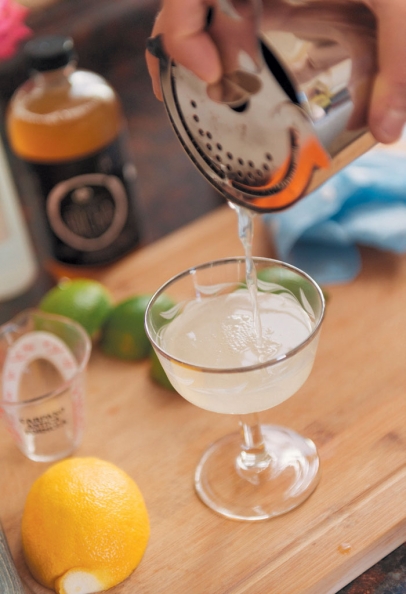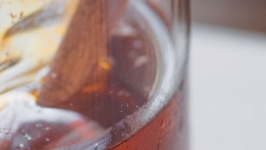Puttin’ On the Fizz: Big Easy 'Bucha Is The First Locally Made Kombucha
When his partner and fiancée, Alexis Korman, first proposed the idea of selling organic kombucha in New Orleans, Austin Sherman thought, No Way. Both had come from more populous cities, Seattle for Sherman and Manhattan for Korman, where kombucha was already a fixture among the alternative medicine and yoga crowd.
Sherman didn’t feel New Orleans was ready to embrace the idea of fermented tea. Although he’d been home brewing kombucha for some time, he expected most New Orleanians had never heard of the drink. But the city’s recent growth and population influx convinced Korman, a freelance wine and travel writer, that an audience for the product was in place. And while large-scale producers had responded to demand for kombucha in major cities, Korman saw a niche, one that would appeal to New Orleanians looking for locally produced, smaller-scale batches.
So last June Big Easy ’Bucha was born. What’s emerged is not only an organic drink that many will find a healthy alternative to soda or artificially sweetened drinks, but also a civic-minded model of business development. The couple is committed that the product remain closely tied to their adoptive city—in name, in production and sourcing of ingredients and, just as important, in giving back.
“About half the people we encounter don’t know what kombucha is,” Korman admits. In its most basic form, kombucha contains four ingredients: bacteria, yeast, sugar and green or black tea. Austin notes that while kombucha has been used a folk remedy in Asian countries for more than 2,000 years and in Russia for over a century, it’s still very new to Americans. Homebrewers may have been around for decades, but the first commercial brewery didn’t open in the United States until 1995.
For some the idea of drinking fermented tea may sound decidedly unyummy. And unless infused with other flavors, the standard kombucha’s vinegary taste can be off-putting. So the couple has been conscious of creating “user friendly” kombucha with light-on-the-palate additions that naturally sweeten and add tang.
Big Easy ’Bucha launched with two flavors: Jazz Juice is an easy, down-the-hatch version sweetened with pineapple and elderflower. Korman dubs it the “gateway kombucha.” The more piquant Cajun Kick offers a spiced infusion of ginger, citrus and cayenne pepper. Both versions use fermented tea, the kombucha standard.
However, as Austin explains, the “mother” (fermenting culture) doesn’t require tea per se, only caffeine. That realization has led to a new third flavor: Voodoo Brew Kombucha, made from local chicory coffee. Because the culture feeds on caffeine, this “kombrewcha” contains only half the stimulant of regular coffee. Like the others, Voodoo Brew is served cold and can take the place of regular iced coffee.
The response to Big Easy ’Bucha has surpassed Sherman’s and even Korman’s expectations. Good Eggs was the first grocery to carry Big Easy ’Bucha; very quickly the online purveyor of local foods “was begging us” to produce more, says Sherman. Since then Big Easy ’Bucha has expanded its distribution to include Green Fork (Metairie and Lower Garden District), Hi-Volt Coffee (Lower Garden District and Uptown), The New Orleans Food Coop (Saint Claude Avenue), Mardi Gras Zone (Marigny), 3 Potato 4 (South Broad and Washington).
Within six months, Big Easy ’Bucha had expanded production enough that Sherman now works for his company full time and they’ve recently hired an employee. Another sign of early success: The start-up was recently selected by Idea Village, an invite-only business accelerator that helps small businesses in New Orleans with funding, business plans and marketing.
While there are no Western scientific studies that prove kombucha’s health benefits and while there are issues that can arise for home brewers who do not properly sterilize containers, there are thousands of anecdotal stories and followers who fervently believe in kombucha’s medicinal properties. A former Diet Coke-for-breakfast workaholic, Korman claims her switch from soda to kombucha was essential in boosting her immunity and regulating her digestion. And because kombucha is slightly effervescent, it can satisfy those addicted to carbonated soft drinks.
Sherman has likewise been drinking kombucha for years, long before he met Korman. As a chronically exhausted real estate developer, he drank a bottle by chance and immediately felt more energy and focus. He also credits consistent kombucha intake with drastically improving his immunity and reducing colds.
The couple’s commitment to New Orleans extends to their desire to reduce waste and reinforce a healthy community. Like many recent transplants from urban areas, Korman was shocked at the city’s minimal efforts to recycle and was keenly aware that her product is bottled in glass, a material our city can’t seem to recycle. One small step in the right direction: draft options for Big Easy ’Bucha and biodegradable pint cups available at Hi-Volt Coffee. A second is the use of growlers—67-ounce reusable glass containers, available through Green Fork and Green Egg, which offer a slight volume price discount over the 16-ounce bottle.
For independent entrepreneurs and start-ups like Big Easy ’Bucha, New Orleans is experiencing an exciting time. However, Sherman and Korman also note that if this growth is to benefit the city as a whole and if New Orleans is to remain true to its roots, that development needs to benefit everyone. Indeed they recognize that they would never have been able to raise the capital or taken the risk to begin an independent business in either high-stakes Seattle or Manhattan.
“Growth needs to expand from the bottom up,” says Sherman. As a result, Big Easy ’Bucha donates 10% of its profits to the Saint Jude Community Center, a soup kitchen on Rampart Street. The couple hopes that as their products reach a wider audience, they’ll be able to partner with multiple local charities—an idea that, like their product, goes down well.
For more on Big Easy’ Bucha, including a list of all vendors, go to BigEasyBucha.com.
GOOD TO KNOW: Never had kombucha, but game to try? While kombucha veterans may drink several bottles a day, Sherman and Korman recommend first-time users begin with a single serving a day (eight ounces, or half a bottle) and let their stomach acclimate to the cultures.









